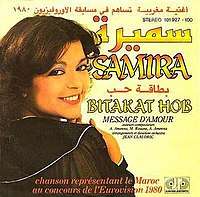Morocco in the Eurovision Song Contest
Morocco participated in the Eurovision Song Contest for its first and only time at the 1980 contest. Its selected song "Bitaqat Hub", sung in Arabic and performed by Samira Bensaïd, placed second to last. The country has not returned to the contest since.
| Morocco | |
|---|---|
 | |
| Member station | SNRT |
| National selection events | Internal selection
|
| Participation summary | |
| Appearances | 1 |
| First appearance | 1980 |
| Last appearance | 1980 |
| Best result | 18th: 1980 |
| Worst result | 18th: 1980 |
| External links | |
| Morocco's page at Eurovision.tv | |
Background
The Eurovision Song Contest is an annual international song competition held by the Eurovision broadcasting organisation since 1956, with participants representing primarily European countries. Each participating country submits an original song to be performed on live television and radio, then casts votes for the other countries' songs to determine the winner. Since its inception, entry to the contest has been open to all members of the European Broadcasting Union (EBU), a group also containing countries in North Africa and the Middle East. Before Morocco's 1980 participation, Tunisia (at the 1977 Contest) was the only African country that had intended to compete, before its eventual withdrawal from the contest.[1]
Contest history

Morocco' first and only participation in the Eurovision Song Contest was in 1980,[2] when the contest was held in The Hague, Netherlands. Its entry was organized by Moroccan broadcaster and EBU member, Société Nationale de Radiodiffusion et de Télévision (SNRT) which had internally selected the song "Bitaqat Hub", performed by Moroccan singer Samira Bensaïd. The song itself is a moderately up-tempo number, with clear influences from western disco, but with Arabic overtones. Bensaïd sings of the need for peace among the nations of the world, taking the role of "the children of the world" in order to describe a vision of a war-free, hatred-free society in which "life is now full of peace". The song was performed fifth on the night. Jean Claudric conducted the orchestra for the entry.[3] At the close of voting, it had received 7 points, all of them from Italy, placing 18th in a field of 19,[2] and ahead of perennial last-place recipient Finland. With its performance, Morocco was the first African country to enter the contest and the song was the first to be sung in Arabic.
The following table shows the points awarded by Morocco to other countries for their performances:
| 12 points | |
| 10 points | |
| 8 points | |
| 7 points | |
| 6 points | |
| 5 points | |
| 4 points | |
| 3 points | |
| 2 points | |
| 1 point | |
Due to the poor finish, Morocco's then-king Hassan II is reported to have decreed that the country would not return in subsequent years. Additionally, given the presence of Israel in the Contest (Israel having opted out of the 1980 edition, which they were eligible to host, as it was scheduled on the Israeli Memorial day eve), it is unlikely that any further Moroccan entries will be forthcoming.
The result did not affect Bensaïd's career, as she went on to become a leading recording artist in the Arab world. She recorded a French version of the song "Message d'amour", found on the b-side of the single and in 1980, Filippos Nikolaou released a Greek cover version "Tosi kardia, tosi agapi" (Greek: "Τόση καρδιά, τόση αγάπη").[4]
Future
A second Moroccan broadcaster, 2M TV, has expressed their intention to join the European Broadcasting Union (EBU). Should their application be successful, 2M TV, Morocco would be eligible to return to the contest with an alternative broadcaster.[5][6][7][8] In May 2018, the Israeli Minister of Communications announced that he would invite countries of the Arab world to participate in the 2019 contest in Tel Aviv,[9] but Morocco was not on the list of participating countries released on 7 November 2018.
Contestants
| Year | Artist | Language | Title | Final | Points |
|---|---|---|---|---|---|
| Samira Bensaïd | Arabic | "Bitaqat Hub" (بطاقة حب) | 18 | 7 |
References
- O'Connor, John Kennedy (2007). The Eurovision Song Contest: The Official History. UK: Carlton Books. p. 68. ISBN 978-1-84442-994-3.
- "32 years ago today- Morocco's only ever participation". Eurovision.tv. European Broadcasting Union. 19 April 2012. Retrieved 3 April 2020.
- And the conductor is... Jean Claudric
- Eurovision Cover - Bitakat hob (Greek).
- "2MTV aims to full EBU membership". Oikotimes. 12 July 2007. Archived from the original on 20 November 2008. Retrieved 17 October 2008.
- Kuipers, Michael (12 July 2007). "Morocco to return in the next few years?". ESCToday. Retrieved 5 September 2008.
- "Commercial channel interested to join Eurovision Song Contest". Oikotimes. 31 August 2008. Archived from the original on 6 September 2008. Retrieved 6 September 2008.
- Akhasvil, Sopon (3 June 2014). "With the IBA in peril, Israel may withdraw in 2015". Wiwibloggs.com. European Broadcasting Union. Retrieved 4 June 2014.
- Cobb, Ryan (22 May 2018). "Israeli Minister "to invite" Arabic nations, including Tunisia, to take part in Eurovision 2019". escxtra.com. Retrieved 2 December 2019.
External links
- Points to and from Morocco eurovisioncovers.co.uk